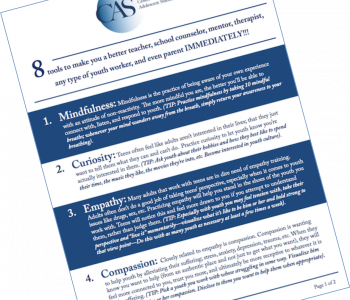
Building Authentic Relationships (BARs) With Teens Online Course
The Building Authentic Relationships (BARS) with Teens is a completely online (video-based) training on how to build authentic relationships with teenagers. This course spans disciplines and is applicable to those in the mental health, health, probation, and education professions and more! This training overviews how to develop genuine relationships; how to use self-disclosure skillfully, how to deal with resistance and set health boundaries, and presents time-tested techniques that bring adults and adolescents closer. Although participants receive lifetime access to the course content, the course is cohort-based and runs 4-weeks and has a 2-week grace period to finish all lessons in order to receive a certificate of completion (along with CE).
Enrollment now closed. Check back soon for next cohort opening
Course Syllabus
This introductory module orients you to the entire BARs course and offers foundational training.
- Lesson 1: Introduction to BARs online
- Lesson 2: What are authentic relationships anyways?
- Lesson 3: Practice Assignment 1
- Lesson 4: Deep listening (Part 1)
- Lesson 5: Deep listening (Part 2)
- Lesson 6: Inherently Non-Clinical Relational Activities (INCRA)
- Lesson 7: Practice Assignment 2
- Lesson 1: Welcome to week 2
- Lesson 2: Why self-disclosure?
- Lesson 3: Personal life information
- Lesson 4: Mechanisms of work
- Lesson 5: What is “skillful” self-disclosure
- Lesson 6: Skillful self-disclosure examples (part 1)
- Lesson 7: Skillful self-disclosure examples (part 2)
- Lesson 8: Self-disclosure and cultural considerations
- Lesson 9: Practice assignment 1
- Lesson 10: Basic counseling skills (part 1)
- Lesson 11: Basic counseling skills (part 2)
- Lesson 12: Mindful Check-in
- Lesson 13: Future visualization
- Lesson 14: Core values
- Lesson 15: Practice assignment 2
- Lesson 16: Mid-term quiz
Learn what makes self-disclosure so important in working with teens and how to practice it skillfully.
- Lesson 1: Welcome to week 3
- Lesson 2: What is resistance (part 1)
- Lesson 3: What is resistance (part 2)
- Lesson 4: Self-management (part 1)
- Lesson 5: Self-management (part 2)
- Lesson 6: Leadership-based interventions
- Lesson 7: Blending interventions
- Lesson 8: Authentic communication interventions
- Lesson 9: Resistance and trauma
- Lesson 10: Practice assignment
- Lesson 1: Welcome to week 4
- Lesson 2: Self-care assessment (part 1)
- Lesson 3: Self-care assessment (part 2)
- Lesson 4: Self-care assessment (part 3)
- Lesson 5: Understanding resistance via a self-care paradigm
- Lesson 6: Practice assignment
- Lesson 7: Final quiz
- Lesson 8: Course evaluation
Learning Objectives
- Define deep listening and its relevance to working with adolescents
- Identify 5 aspects of deep listening
- Define skillful self-disclosure
- Demonstrate examples of skillful self-disclosure
- Review parenting styles and how they relate to boundary setting schemas
- Present a method for setting healthy boundaries with adolescents
- Define resistance as a protective mechanism
- Present a 3-level model (pyramid) for working with resistance
- Review basic counseling skills that motivate adolescents
- Demonstrate the need for self-care
Continuing Education Information
This course meets criteria to provide 8 hours/credits/units of continuing education (CE) to psychologists in the United States, and LMFTs, LPCCs, LCSWs, and LEPs in the State of California. The Center for Adolescent Studies is approved by the American Psychological Association to sponsor CE for psychologists. The Center for Adolescent Studies maintains responsibility for all programs and its content. The Center for Adolescent Studies offers continuing education units (CEUs) to LMFTs, LCSWs, LEPs, and LPCCs, and any other professional license governed through the California Board of Behavioral Sciences (provider # 4988). Please note: If you are a non-psychologist mental health professional from a state outside of California, check with your licensing committee as many accept CE from APA approved sponsors. The Center for Adolescent Studies is submitting applications for the National Association of Social Work (NASW), the National Board of Certified Counselors (NBCC), and other mental health CE accrediting agencies. Teachers seeking professional development (PD) please get this course approved by your school board. For more information regarding CE/PD of this course and the Center for Adolescent Studies, click here
Course Instructor
Sam Himelstein, Ph.D., works as a Licensed Psychologist (PSY25229) in the the Chemical Dependency program at Kaiser Permanent with teens and their families, in private practice in Oakland, CA, researches the efficacy of mindfulness-based interventions with incarcerated and underserved adolescent populations, is an author of multiple scholarly journal articles and two books, travels the country speaking at conferences and conducting professional trainings, and is the founder and president of the Center for Adolescent Studies. Dr. Himelstein is passionate about training professionals from multiple disciplines in creating authentic, healing relationships with adolescents that contribute to positive outcomes. A formerly incarcerated youth himself, Dr. Himelstein was privileged to change his life from a path of drugs, violence, crime, and self-destruction to that of healing and transformation. His mission is to help young people become aware of the power of self-awareness and transformation, and train professionals with similar interests. Learn more about his philosophy and approach in his books: A Mindfulness-Based Approach to Working with High-Risk Adolescents (Routledge, 2013), and Mindfulness-Based Substance Abuse Treatment for Adolescents: A 12-Session Curriculum (Routledge, 2015).

